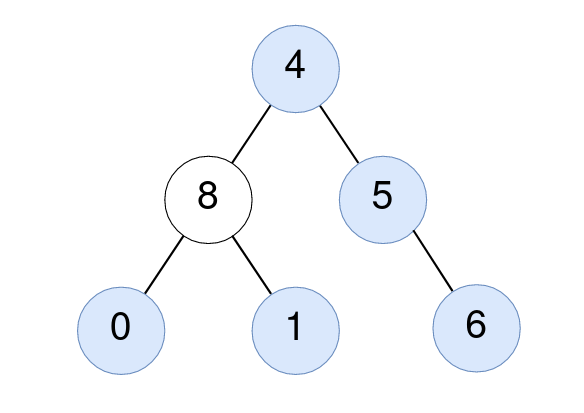LeetCode in Kotlin
2265. Count Nodes Equal to Average of Subtree
Medium
Given the root of a binary tree, return the number of nodes where the value of the node is equal to the average of the values in its subtree.
Note:
- The average of
nelements is the sum of thenelements divided bynand rounded down to the nearest integer. - A subtree of
rootis a tree consisting ofrootand all of its descendants.
Example 1:

Input: root = [4,8,5,0,1,null,6]
Output: 5
Explanation:
For the node with value 4: The average of its subtree is (4 + 8 + 5 + 0 + 1 + 6) / 6 = 24 / 6 = 4.
For the node with value 5: The average of its subtree is (5 + 6) / 2 = 11 / 2 = 5.
For the node with value 0: The average of its subtree is 0 / 1 = 0.
For the node with value 1: The average of its subtree is 1 / 1 = 1.
For the node with value 6: The average of its subtree is 6 / 1 = 6.
Example 2:

Input: root = [1]
Output: 1
Explanation: For the node with value 1: The average of its subtree is 1 / 1 = 1.
Constraints:
- The number of nodes in the tree is in the range
[1, 1000]. 0 <= Node.val <= 1000
Solution
import com_github_leetcode.TreeNode
/*
* Example:
* var ti = TreeNode(5)
* var v = ti.`val`
* Definition for a binary tree node.
* class TreeNode(var `val`: Int) {
* var left: TreeNode? = null
* var right: TreeNode? = null
* }
*/
class Solution {
private var ans = 0
fun averageOfSubtree(root: TreeNode?): Int {
dfs(root)
return ans
}
private fun dfs(node: TreeNode?): IntArray {
if (node == null) {
return intArrayOf(0, 0)
}
val left = dfs(node.left)
val right = dfs(node.right)
val currsum = left[0] + right[0] + node.`val`
val currcount = left[1] + right[1] + 1
if (currsum / currcount == node.`val`) {
++ans
}
return intArrayOf(currsum, currcount)
}
}

